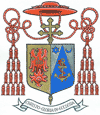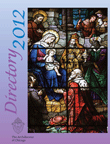
The Cardinal's Column
Francis Cardinal George, O.M.I.
Is the human mind
bigger than scientific method?
Cardinal George's Schedule
- January 23-25: Rome
- January 24: 11a.m., Presentation, International Conference on Charity, Vatican; 5 p.m., Mass, St. Peter’s Basilica
- January 26: 12 p.m., Catholic University Presidents’ Luncheon Meeting, Lewis University, Romeoville; 6 p.m., Amate House Visit
- January 27: 9 a.m., Chicago Project on Violence Prevention Breakfast, School of Public Health, Chicago; 10:45 a.m., Catholic Extension Society Executive Committee Meeting, Residence; 1:30 p.m., Administrative Council Meeting, Pastoral Center
- January 28: 9 a.m., Archdiocesan Pastoral Council General Meeting, Pastoral Center; 1:30 p.m., Invocation, Speak Out Illinois Conference, Drury Lane, Oakbrook Terrace; 6:30 p.m., Casa Jesús Annual Dinner, Pierre’s Banquet, Berwyn
- January 30: 8:30 a.m., Catholic Conference of Illinois, Catholic Legislators’ Breakfast, Hotel Monaco, Chicago
- January 31: 7 p.m., 2006 Pallium Lecture, Archdiocese of Milwaukee
- February 2: 2 p.m., Liturgy of Episcopal Ordination of the Most Rev. George Rassas, Holy Name Cathedral
- February 3: 7:30 a.m., Big Shoulders Fund Executive Committee, Mid-Day Club; 5 p.m., Tour Good Shepherd Cemetery, Orland Park; 6:30 p.m., Poor Clare Benefit Dinner, Lemont
- February 4: 1 p.m., Consecrated Life Day, De Paul University

Cardinal's Appointments
His Eminence, Francis Cardinal George announces the following appointments:
Pastors
Rev. Andrew J. Santos, from associate pastor of Infant Jesus of Prague Parish, Flossmoor, to pastor of St. Odilo Parish, Berwyn, effective Feb. 12.
Rev. Freddy Washington, C.S.Sp. to be the pastor of St. Mary Magdalene Parish, South Marquette, effective immediately.
Rev. Wayne Watts, from assistant director of Catholic Charities and associate pastor of Queen of All Saints Basilica, North Sauganash, to be the pastor of St. John Berchmans, West Logan Blvd., effective Jan. 27.
Administrators
Rev. Phillip F. Cioffi, from associate pastor of Immaculate Conception Parish, Highland Park, to be the administrator of the same, effective immediately.
Rev. Joseph Glab, CR, from president of Gordon Tech High School, to be the administrator of St. Hedwig Parish, North Hoyne, with residence at Gordon Tech High School, effective immediately.
Rev. Farrell Kane, O. Carm, to be the administrator of Immaculate Conception Parish, Waukegan, retaining duties as pastor of St. Paul the Apostle Parish, Gurnee and acting vicar of Vicariate I, effective immediately.
Pastors emeriti
Rev. Herbert Meyer, from pastor of St. James Parish, Maywood, to retire after 44 years of service and be pastor emeritus of the same, effective immediately. He has also been appointed temporary administrator of the parish.
Rev. Robert E. Ferrigan, from pastor of Sacred Heart Parish, Winnetka, to retire after 44 years of service and be pastor emeritus of the same, effective immediately.
In the news lately have been many stories and comments about evolution and design in nature. Is so-called “intelligent design theory” scientific or religious? The short answer is: neither. It’s philosophical. That means theories about purpose in natural order can be constructed and argued without referring to religious belief and without verification by scientific method. They can be rationally debated as true or false without the help of revelation and outside of a laboratory. Philosophers have speculated about the origin of the world without knowing either the Bible or scientific method. In their speculations, philosophers have constructed methods of argument and proof that are purely rational but not scientific in the contemporary sense.
Unfortunately, public philosophy practically disappeared from American discourse about 50 years ago. All we have now are scientific arguments on the one hand and religious beliefs on the other. When a difficult question like that of the beginning of the cosmos and of the human race comes up, people suppose the answer has to be given either in strictly scientific terms or in a religious framework. That supposition is itself a mistake and leads to settling public arguments by asking judges to decide things outside their competence, since judges now referee every public discussion in our country. Ironically, the law is itself a work of supposedly intelligent design, as are the arguments it uses; yet law is neither scientific nor religious. Lawyers, it seems to me, have no business telling anybody what is scientific or what is religious based only on their own speculations; but that’s the kind of social order that has evolved in this country.
The year 2005 was the 150th anniversary of the publication of a book by Charles Darwin, “The Origin of Species by Means of Natural Selection.” Darwin’s seminal work and theories will be the subject of many museum expositions this year, including an important exhibit in the Field Museum of Natural History here in Chicago. Darwin himself was of several opinions about how his scientific work impacted religion, a field which interested him but which he apparently left personally unresolved. Darwin, from his careful observations of the historical development of plants and insects and birds and animals, crafted a theory of random natural selection to explain the development of biological species. If natural selection appears random, then nature would seem to have no purposeful design and would not need a designer. Darwinists in the last 150 years have often used Darwinism’s very success in explaining the development of biological species to make it a philosophical theory, a universal explanation for everything in nature, the only key to truth about reality. When scientists overreach, they leave science and do philosophy.
A case in point is Richard Lewontin of Harvard University, who was quoted in a Chicago newspaper last Oct. 6: “Our willingness to accept scientific claims that are against common sense is the key to an understanding of the real struggle between science and the supernatural. We take the side of science in spite of the patent absurdity of some of its constructs, in spite of its failure to fulfill many of its extravagant promises of health and life, in spite of the tolerance of the scientific community for unsubstantiated just-so stories, because we have a prior commitment to materialism.” Materialism is not a modern scientific theory; it’s a philosophical theory with an ancient pedigree. The fact that modern scientific theory can study only material phenomena does nothing to prove the truth of philosophical materialism. When a scientist makes such a claim, he enters an intellectual realm that has nothing to do with his own expertise. He overreaches. When anyone uses “evolution” as a noun, as if it were a name for “God,” a line has been crossed. Honest scientists know this, including those Darwinists who strive to explain evolutionary theory in such a way that it does not become another form of philosophical materialism and cannot be used to “disprove” spiritual realities that fall, by definition, outside of the purview of scientific method.
If scientists need to be careful not to overreach, so do theologians and people of faith. One need not seize on the weakness of some aspects of Darwinian theory or its incompleteness in order to “prove” the need for God. One begins the philosophical argument for God’s existence by reaching behind the observable, behind any scientific theory, and asking why there is anything at all rather than nothing. Unwilling to posit a Creator and yet aware of the fact that something cannot come from nothing, the ancient philosopher Aristotle said that the world must be eternal. It never had a beginning at all. That’s an honest and an arguable thesis on its own philosophical presuppositions. St. Thomas Aquinas thought it the only possible philosophical answer, unless one believed in a Creator. St. Thomas thought, of course, that one could find philosophical arguments for the existence of God. He didn’t need them, because he accepted God’s existence from his own religious faith. But faith didn’t invalidate arguments for God’s existence from natural reason alone. Thomas respected both science, as he knew it, and philosophy.
As believers, however, St. Thomas and we accept many truths from divine revelation. Some of these truths of faith can be supported by rational argument; for example, the need for a Creator to bring something out of nothing. Other truths of faith, while not irrational, cannot be proven; for example, the resurrection of Jesus Christ from the dead. We rely on witnesses and the power of the Holy Spirit in our own hearts to find conviction about such truths. The written witness to the acts of God, Holy Scripture, is free of error, but only on its own terms. The Bible is not like a newspaper but like a library, with many different literary forms used to give witness to the truths of divine revelation in different ways. The Bible is itself witness not only to God’s self-revelation in history but also to the range of the human intellect, able to consider the visible and the invisible, able to discourse about the entire range of reality. Intellection, or the use of human intelligence, is one way to show that human beings are not reducible to the purely material.
Last month, the Church read the beginning of the Gospel according to St. John: “In the beginning was the Word.” In a couple of months, at the Easter Vigil, we will read from Genesis: “In the beginning, God created the heavens and the earth.” There are patterns in nature, and these can be used both to demonstrate evolutionary development in science and to argue to the existence of a purposeful designer in philosophy. In faith, however, contemplating the order of the universe leads to adoration and gladness of heart. We are not alone. God sustains us in being and accompanies us in history. Nothing in science disproves that, nor can it. Grateful to God for the gift of faith, we need to be grateful as well for the advance of science and the gift of human intelligence in all its dimensions. God bless you.
Sincerely yours in Christ,
Francis Cardinal George, OMI
Archbishop of Chicago



